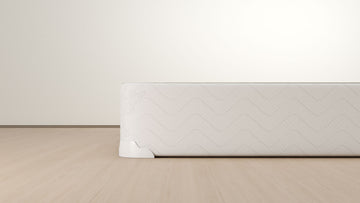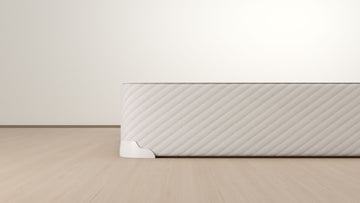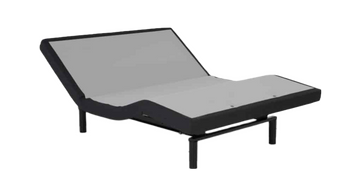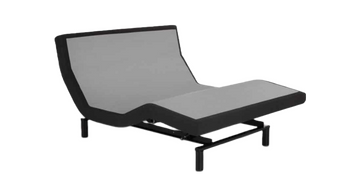Struggling with a cold or flu
Sleep with your head raised: Cold and flu both lead to a buildup of pressure in the sinuses that cam then leads to pain in the face. Fortunately, gravity is your friend in this situation. All you need to do to relieve sinus pressure is make your head higher than your body.
The easiest way to do this is to create a wedge using a few pillows to prop yourself up in bed. The elevation should encourage phlegm secretions to drain, helping you breathe and sleep a little easier.
Just make sure that you’re not propped up in a way that bends your neck and makes it harder to breathe.
Struggling with the stomach flu
Sleep on your side with your head elevated: If you find yourself vomiting a lot, then sleep on your side with your head elevated. Sleeping in this position will prevent you from choking on your own vomit if you happen to throw up while sleeping (which not only sounds gross but is also extremely dangerous).
If you are really sick, keep a bucket and lots of water by your bed just in case. Remember, sleeping on your side will make it easier to throw up if and when the time to purge arrives.
If you're not sick but pregnant
Sleep on your side: Experts recommend that pregnant women adopt the “SOS” (sleep on side) sleeping position. Researchers believe that it can improve circulation, giving nutrient-packed blood an easier route from your heart to the placenta to nourish your baby.
Furthermore, some experts think that sleeping on your left side may be even better than sleeping on your right. Lying on the left side, they argue, may help to reduce the pressure from the weight of your baby on your liver.
Try, if possible, to keep your legs and knees bent, and put a pillow between your legs. If you find that you are having problems with back pain, use the “SOS” position and try placing a pillow under your abdomen as well.
If you experience heartburn during the night, you may want to try propping up your upper body with pillows. Adopting this position will allow you to take advantage of the force of gravity to fight against any acid reflux traveling up your esophagus.
In late pregnancy, you may experience shortness of breath, even while you sleep. If you find yourself panting, try lying on your side or propped up with pillows. This position will help to open up the diaphragm and reduce pressure from the baby below.
While these suggestions might not sound entirely comfortable, especially if you usually sleep on your back or stomach, they are, nonetheless, worth a try. You may find that they make a difference in the overall quality of your sleep in the latter stages of pregnancy. Bear in mind that you don’t have to remain in one position all night: rotation is fine.
What if I wake up on my back during the night?
The research available to date focuses on the position you should adopt when going to sleep, not the position you should take during the night. Thus, if you wake up on your back, the current advice is to settle back to sleep on your side. In reality, that is the only thing that you can do. You cannot control your position when you are asleep.
If you do find yourself lying on your back during the night, there is no need to be alarmed. First, being heavily pregnant makes back-sleeping less comfortable. This fact means that back sleeping episodes probably won’t last very long. Second, we know that the position we go to sleep in is the position we spend the most extended amount of time during the night, giving mothers more control over their unconscious posture.
Struggling with PMS
Lie on your back: If you have PMS, it can be challenging to know which position to take – all of them seem pretty uncomfortable. When you’re bloated and crampy, you’ll want to avoid either curling up in a ball or passing out on your stomach. You’ll also want to try not to lie on your side as this lets gravity tug on already-tender breast ligaments. Lying facedown isn’t an option either, as it puts excess weight and pressure on your uterus, causing irritation and more cramping. Your best bet, therefore, is to lie on your back.
To make the experience more comfortable, place a pillow under your knees to prevent lower back soreness than can result from excessive arching of the spine. Keep your arms neutral at your sides. (If you’re still sore, try putting another pillow under your knees for even more lower-body support.)
Struggling with Acid Reflux
Sleep on your left side: Acid reflux can be incredibly painful. Burning acid making its way up your esophagus is not pleasant.
Here you want to choose a sleeping position that makes gravity work in your favor. Your stomach is positioned to the left below your esophagus. Sleeping on your left-hand-side, therefore, helps ease the effects of acid reflux and heartburn. Should stomach acid escape, gravity will return it to your stomach faster than it would if you were lying on your right side or back. Several studies back up this claim, making left-side sleeping the most effective of all of the flat-sleeping positions.
Interestingly, there’s a difference in the type of acid reflux people experience depending on the side that they lie on. Lying on the right side tends to produce more liquid reflux while lying on your left side causes more gaseous reflux symptoms. Burping might be annoying, but it is also far less painful.
Elevating your head while sleeping on your left side can improve nighttime digestion. Studies show that this position helps ease heartburn as the lower esophageal sphincter (LES) – the muscle ring/flap valve that controls the stomach’s intake of food from the esophagus – is kept above the level of gastric acid. In the event of reflux, acid flows quickly back to the stomach because of gravity’s pull.
Struggling with Digestion Issues
Sleep on your left side: Did you know that sleeping on your left side can promote better coordination between your digestive system and GRAVITY? Well, it’s true!
The reason for this has to do with the position of the digestive tract. It turns out that the small intestine moves waste to your right side to make its way to the large intestine and then to the lower colon on the left side. This increases the likelihood of having your bowel movement first thing in the morning.
Additional tips to help aid digestion:
- Elevate your head
- Add pillows in between knees
- Don’t eat large meals 3 hours before sleeping












